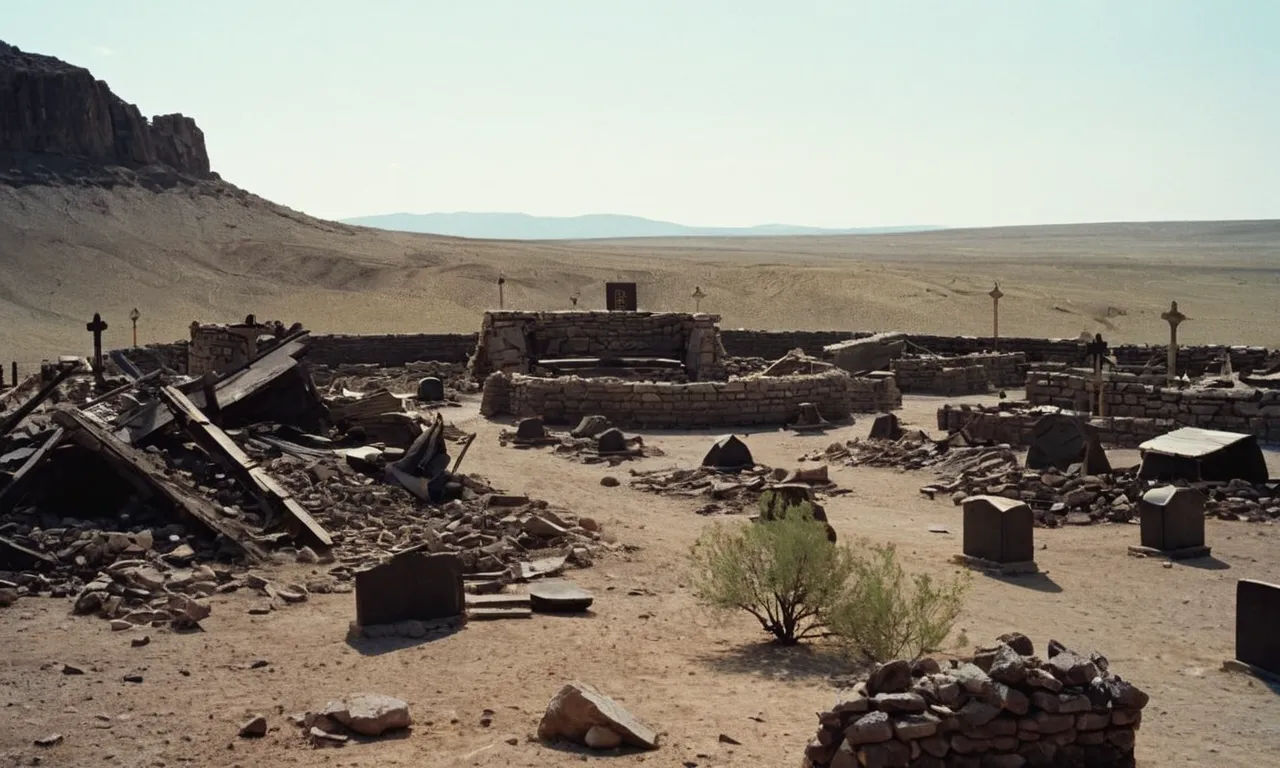Why Did God Ask Saul To Destroy The Amalekites?
The destruction of the Amalekites at God’s command to Saul is one of the most troubling stories in the Bible. At first glance, it seems brutal and at odds with God’s character of love and mercy.
If you’re short on time, here’s a quick answer: God commanded Saul to attack the Amalekites as judgment for how they attacked the Israelites after the Exodus. Still, Saul’s failure to fully carry out God’s orders revealed his incomplete obedience and cost him the kingdom.
In this comprehensive article, we will examine the biblical account, the sins of Amalek, the meaning of ‘devotion to destruction,’ Saul’s incomplete obedience, precedent in the time period, God’s justice and mercy, implications for Canaanite conquests, and the moral difficulties this passage poses.
The Biblical Account of Saul and the Amalekites
In 1 Samuel 15, God instructs King Saul to attack the Amalekites and “utterly destroy all that they have, and do not spare them” (1 Samuel 15:3). This command was given in retribution for the Amalekites’ opposition to the Israelites after the exodus from Egypt.
The Amalekites attacked the Israelites who were weak and feeble in the rear ranks during their journey (Deuteronomy 25:17-18). As punishment, God declared war on the Amalekites, intending their complete destruction.
1 Samuel 15 – God’s Instructions to Saul
God ordered Saul to destroy the Amalekites entirely – men, women, children, infants, oxen, sheep, camels, and donkeys. Saul gathered an army of 210,000 troops and waged war against the Amalekites. He defeated them, but allowed the king Agag to live and kept the best sheep, cattle, and goods.
God regretted making Saul king, as he did not fully obey this command to utterly destroy the Amalekites.
Saul’s Incomplete Obedience
Although Saul followed most of God’s instructions, he did not completely destroy the Amalekites. He spared King Agag’s life and kept the best livestock and goods for himself and the army. Saul justified this disobedience by claiming the animals would be used for sacrificial offerings to God.
However, God was clear in His command and expected full obedience from Saul. Samuel rebuked Saul, saying “to obey is better than sacrifice” (1 Samuel 15:22).
God’s Judgment on Saul
Due to Saul’s incomplete obedience, God rejected him as king over Israel. Samuel declared that God regretted making Saul king because he failed to follow His command fully (1 Samuel 15:11). As a result, God took the kingdom from Saul and tore it from him, seeking a man after His own heart to be king instead (1 Samuel 13:14).
Though Saul appeared repentant and asked for forgiveness, God’s judgment was final. The consequences of Saul’s disobedience were severe.
The Sins of Amalek
Amalek’s Attack on Israel
The Amalekites were descendants of Esau who attacked the Israelites after they left Egypt during the Exodus. As the Israelites were traveling through the desert, the Amalekites ambushed them, killing the stragglers who were weak and tired (Deuteronomy 25:17-18).
This unprovoked attack on a people who posed no threat showed the Amalekites’ cruelty and contempt for God.
Later when the Israelites were about to enter the Promised Land, the Amalekites teamed up with the Canaanites and attacked them again, but Joshua led the Israelites to victory over them (Exodus 17:8-13).
The Amalekites’s insidious assaults on God’s people revealed their wickedness and opposition to God’s purposes.
Amalek: Archetype of Israel’s Enemies
The Amalekites came to represent Israel’s archetypal enemy. They epitomized the type of evil that constantly threatens God’s people. Throughout Israel’s history, whenever an enemy arose to destroy them, the Bible equates them with the Amalekites (Numbers 24:20; Psalm 83:2-7).
God commanded Saul to totally annihilate the Amalekites (1 Samuel 15:2-3). This severe judgment was due to their long legacy of hostility toward God’s chosen people. The Amalekites’ hatred of Israel was rooted in their hatred of God. They served as a picture of Satan and the anti-God world system.
The Amalekites also illustrate how sin replicates. Even hundreds of years later, the Amalekites were still attacking Israel. Sin keeps reproducing itself generation after generation. Its effects linger and infect subsequent generations. Only God’s grace can break these generational curses.
The Meaning of ‘Devotion to Destruction’
The command given to Saul to destroy the Amalekites has troubled many readers of the Bible. At first glance, it seems harsh and contrary to God’s love and mercy. However, a deeper look reveals that there were important reasons behind this severe judgment.
The phrase “devote to destruction” translates the Hebrew word herem. This was a form of judgment reserved for the enemies of God’s people and wicked nations who had sunk into deep moral depravity. The herem was an act of divine retribution and vengeance against those who had stubbornly rejected God and committed unspeakable atrocities.
The Amalekites had ruthlessly attacked the Israelites when they came out of Egypt, massacring the weak and feeble who lagged behind (Deut. 25:17-18). God pronounced judgment on the Amalekites for this heartless act (Ex. 17:14). Four hundred years later, the time had come for their judgment.
Three key factors help explain the severity of the herem against the Amalekites:
- The Amalekites were incorrigibly wicked, irredeemably corrupt, and ritually impure as a society.
- Their presence posed a lethal threat to Israel’s relationship with God and obedience to the covenant.
- As the sovereign Judge, God has the prerogative to punish persistent, generational sin.
The herem was an act of God’s justice in wiping out an extremely depraved culture. It prevented corrupting influences from poisoning Israel’s society. While difficult to comprehend at times, God’s judgments stem from His holiness and perfection.
He alone has the divine wisdom to carry out justice in a world tainted by evil.
Precedent in the Ancient Near East
Destruction of People Groups
The destruction of the Amalekites was not without precedent in the Ancient Near East. Other ancient texts record similar acts of destruction against enemy peoples. The Assyrians, Babylonians, and Egyptians all engaged in the complete destruction of opposing groups on occasion.
Sennacherib recorded his destruction of Babylon in 689 BC: “That city (Babylon) I destroyed to its foundations, I devastated, I burned with fire. The wall and outer wall, temples and gods, temple towers, I razed and dumped into the Arahtu canal.”
The Moabite Mesha stele from around 850 BC also describes the complete destruction of opposing peoples: “I slew all the people of the town as satiations for Kemosh and Moab…And I brought back the fire-hearth of Dwdh, which dwelt in front of Israel…And I slew all the priests thereof.”
Such acts of destruction were seen as asserting the supremacy of one’s national god over the opposing nation and demonstrating one’s strength.
While disturbing to modern sensibilities, the ancient Israelites were operating within the common wartime practices of the day. As a fledgling nation surrounded by much larger powers, Israel no doubt felt a need to strongly assert itself and strike fear into its enemies.
The destruction of the Amalekites can be viewed in this context while still recognizing modern ethical objections to such acts.
Corporate Responsibility
The concept of corporate responsibility or corporate identity was common in the ancient world. Individuals were seen as immersed within and representing their larger family, tribe, or nation. Punishment upon individuals often extended to their whole family or people group.
The Bible reflects this ancient Near Eastern view in places. When Achan sinned by taking devoted items from Jericho, his whole family was stoned with him (Joshua 7:24-26). The sins of the Amorite ancestors resulted in future generations being displaced from the Promised Land (Genesis 15:16).
Corporate responsibility worked in the reverse as well – when men from Jabesh-gilead recovered Saul’s body, David blessed the whole town (1 Samuel 31:11-13).
With corporate identity, it was common and expected that an entire people could be blamed for the actions of their leaders and warriors. This undergirds the command to destroy the Amalekites – they attacked Israel soon after the Exodus (Exodus 17:8-16), so the whole people group fell under judgment.
This does not fit with an individualistic modern perspective. We tend to think punishment should apply only to wrongdoers instead of a whole tribe or ethnicity. But in the ancient setting, Israel’s actions made sense as applying corporate accountability upon Amalek.
It highlights the vast differences between ancient and modern worldviews.
God’s Justice and Mercy
Judgment Where Due
God, being perfectly just, exacts judgment where it is due. The Amalekites had committed grievous sins against Israel during the exodus from Egypt, attacking them when they were weak and vulnerable (Exodus 17:8-16). As a result, God pronounced judgment on the Amalekites (Deuteronomy 25:17-19).
Several hundred years later, God used Saul and the Israelites to carry out that judgment during the time of King Saul.
However, God does not delight in punishment. Ezekiel 18:23 says “Do I have any pleasure in the death of the wicked, declares the Lord GOD, rather than that he should turn from his ways and live?” God patiently waited for hundreds of years before bringing judgment on the Amalekites.
Even then, judgment came only after the Amalekites had defiantly rejected multiple warnings and opportunities to repent.
Opportunity to Repent
In fact, 1 Samuel 15:6 indicates that Saul warned the Kenites to leave the area so they would not be destroyed along with the Amalekites. This demonstrates God’s mercy – even in the midst of judging the Amalekites, God spared the Kenites because they had shown kindness to Israel centuries earlier (Numbers 10:29-32).
Additionally, Saul was told to completely destroy all the Amalekites – man, woman, child, infant, ox and sheep (1 Samuel 15:3). However, Saul disobeyed by sparing King Agag and keeping the best sheep, cattle and valuables (1 Samuel 15:8-9).
This directly parallels when God promised to completely destroy the Canaanites because of their detestable sins, but they were not fully driven out of the land.
This shows that had any Amalekites sincerely repented like Rahab and the Gibeonites, God would have spared them. Their judgment came only because they defiantly rejected opportunities to repent. God takes no pleasure in punishing the wicked, but his justice and holiness demands judgment for unrepentant evil.
Implications for Canaanite Conquests
The destruction of the Amalekites ordered by God has several implications for understanding the later conquest of Canaan as recorded in the Bible. Here are some key points:
1. Divine Judgment
The judgment on the Amalekites shows that God does sometimes order the destruction of entire people groups. This foreshadows the conquest of Canaan. While troubling, the Bible presents this as God’s righteous judgment on morally corrupt cultures.
2. Israel’s Mission
Interestingly, Israel was not commanded to destroy other nations outside of Canaan – only the particularly wicked Canaanite tribes. This shows that Israel’s mission was tied specifically to preparing Canaan for the coming messianic kingdom by removing deeply evil influences.
3. Divine Sovereignty
As seen with the Amalekites, God is sovereign in ordering the rise and fall of nations according to His purposes. The conquest of Canaan likewise demonstrates God’s supreme authority over all human history and destiny.
4. Redemptive Purpose
Though the destruction of Canaan’s inhabitants is difficult for modern readers, the Bible presents it as paving the way for Israel’s redemptive reign in the Promised Land. Despite the violence involved, God ordered the conquest to set the stage for the coming of the Messiah to bless all nations.
Moral Difficulties
A Challenge to Our Sense of Justice
The command from God to Saul to destroy the Amalekites poses a moral difficulty for many. It challenges our sense of justice and fairness. Why would a loving God command such harsh judgment on an entire people group?
Some argue that the Amalekites were guilty of grievous sins and this justified God’s judgment. However, even if true, it still seems excessively harsh, especially towards women, children, and future generations. This understandably troubles many reasonable people.
Potential responses include:
- We have limited knowledge and cannot fully judge God’s actions. His ways and thoughts are higher than ours (Isaiah 55:8-9).
- All people deserve judgment because all have sinned against God (Romans 3:23). We should humble ourselves rather than accusing God.
- God patiently endured the Amalekites’ sins for 400 years before acting in judgment (Genesis 15:16). The judgment was not rash.
- The judgment was to purge evil and wickedness from the land God had set apart for his people. This was an act of love towards Israel.
While simple answers may not satisfy all concerns, we must avoid accusing God of injustice or cruelty. As finite creatures, we should humbly seek God’s perspective on his difficult commands.
Answering Objections
Critics raise two primary objections against God’s command to destroy the Amalekites:
- It was an unjust slaughter of innocent people.
- It causes us to question God’s moral character.
In response, defenders of the faith counter:
- The Amalekites were far from innocent, having dedicated themselves to antagonizing Israel (Exodus 17:8-16).
- God gave them four centuries to repent before acting in judgment (Genesis 15:13-16).
- As Creator, God has the sovereign right to take human life as he determines.
- We should not judge God by limited human standards. His ways are higher than ours (Isaiah 55:8-9).
- God showed mercy by warning the Kenites who lived among the Amalekites to leave beforehand (1 Samuel 15:6).
While God’s severe judgment still startles us, we must remember that all people stand guilty before their Creator. We deserve condemnation, not God. His patience is astounding.
Conclusion
The destruction of the Amalekites poses a moral challenge, as do other instances of herem warfare in the Old Testament. There seem to be justice, precedent, and purpose behind God’s command, yet unease remains.
As fallen and finite human beings, we cannot claim to fully understand God’s workings in judgment and salvation history. We must grapple honestly with these texts rather than dismissing or rationalizing them away.
Through prayer and humility before the word of God, we can gain insight into His character without compromising on compassion or the belief that the Judge of all the Earth must do right.







